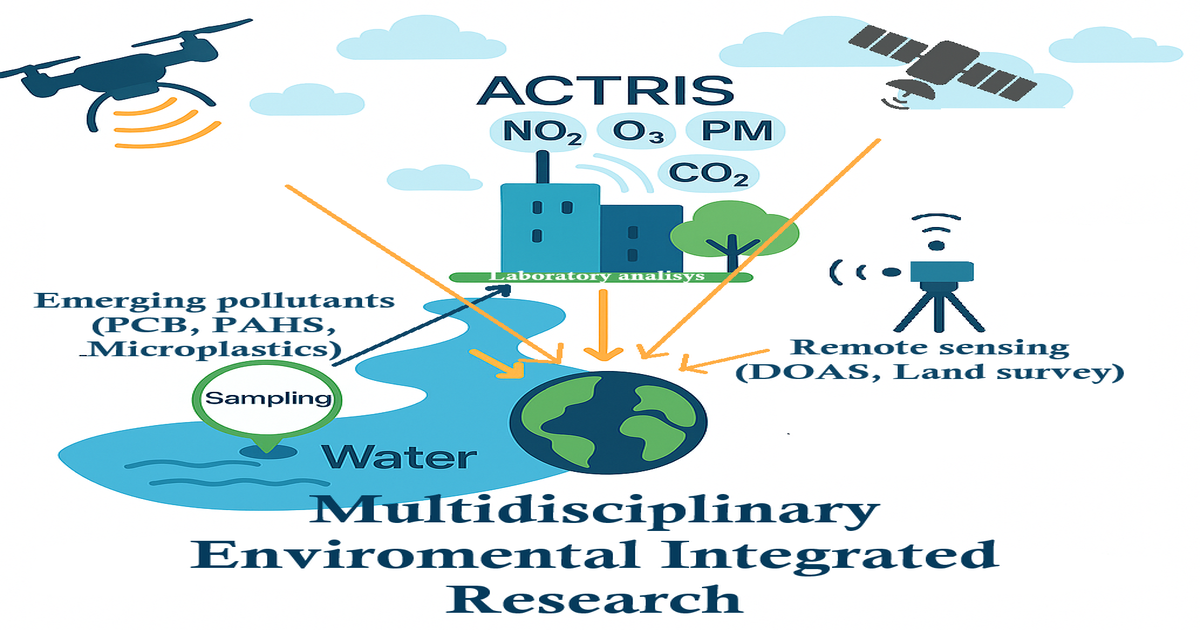Emerging Pollutants, Atmospheric Processes, Urban Heat Islands and Integrated Environmental Observations: Advances in Remote Sensing and Analytical Techniques
A special issue of Sustainability (ISSN 2071-1050). This special issue belongs to the section "Air, Climate Change and Sustainability".
Deadline for manuscript submissions: 15 March 2026 | Viewed by 1120

Special Issue Editors
2. REXDAN Research Infrastructure, Dunarea de Jos University of Galati, 800008 Galati, Romania
Interests: remote sensing; environment engineering; earth sciences; environmental sciences; meteorology; atmospheric sciences; environmental health; GIS; ecology
2. REXDAN Research Infrastructure, Dunarea de Jos University of Galati, 800008 Galati, Romania
Interests: atmospheric pollution; remote sensing; space observations
2. REXDAN Research Infrastructure, Dunarea de Jos University of Galati, 800008 Galati, Romania
Interests: surface water pollution; ground water pollution; wastewater treatment; environmental pollution; soil pollution
Special Issues, Collections and Topics in MDPI journals
Special Issue Information
Dear Colleagues,
The rapid pace of urbanization, industrial activity, and climate change has led to growing concerns over the presence and impacts of emerging pollutants in both atmospheric and aquatic environments. These pollutants, often unregulated or insufficiently monitored, pose significant risks to human health and ecosystems.
This Special Issue aims to bring together cutting-edge research that integrates remote sensing, advanced laboratory techniques, and multidisciplinary analytical approaches to investigate emerging pollutants, atmospheric dynamics, and urban heat islands. We encourage submissions that address novel methods of detecting and quantifying pollutants using high-end techniques, such as gas chromatography, liquid chromatography, ICP-MS, TXRF, and micro-FTIR, as well as remote sensing technologies including DOAS, ACTRIS-based observations, and aerial or satellite-based monitoring. Contributions related to urban climate analysis, land surveys, bathymetry, and data integration from multiple environmental compartments are also highly welcome.
This Special Issue aligns with the scope of Sustainability by promoting a holistic understanding of environmental challenges and providing innovative solutions that support the Sustainable Development Goals.
In this Special Issue, original research articles and reviews are welcome. Research areas may include (but are not limited to) the following:
- Remote sensing applications in air and water quality monitoring;
- Detection and quantification of emerging pollutants;
- Integration of laboratory-based and/or remote-sensing data;
- Urban heat islands and urban climate studies;
- Use of ACTRIS and other advanced infrastructures for environmental research;
- Bathymetry, land surveys, and integrated water-atmosphere-land studies;
- Multidisciplinary and multi-compartment environmental assessments;
- Data fusion, modeling, and decision-support tools for environmental management.
We look forward to receiving your valuable contributions.
Dr. Adrian Rosu
Dr. Daniel-Eduard Constantin
Dr. Mihaela Timofti
Guest Editors
Manuscript Submission Information
Manuscripts should be submitted online at www.mdpi.com by registering and logging in to this website. Once you are registered, click here to go to the submission form. Manuscripts can be submitted until the deadline. All submissions that pass pre-check are peer-reviewed. Accepted papers will be published continuously in the journal (as soon as accepted) and will be listed together on the special issue website. Research articles, review articles as well as short communications are invited. For planned papers, a title and short abstract (about 250 words) can be sent to the Editorial Office for assessment.
Submitted manuscripts should not have been published previously, nor be under consideration for publication elsewhere (except conference proceedings papers). All manuscripts are thoroughly refereed through a single-blind peer-review process. A guide for authors and other relevant information for submission of manuscripts is available on the Instructions for Authors page. Sustainability is an international peer-reviewed open access semimonthly journal published by MDPI.
Please visit the Instructions for Authors page before submitting a manuscript. The Article Processing Charge (APC) for publication in this open access journal is 2400 CHF (Swiss Francs). Submitted papers should be well formatted and use good English. Authors may use MDPI's English editing service prior to publication or during author revisions.
Keywords
- emerging pollutants
- atmospheric dynamics
- urban heat islands
- remote sensing
- DOAS
- ACTRIS
- advance laboratory techniques
- environmental monitoring
- integrated observations
- sustainable development
Benefits of Publishing in a Special Issue
- Ease of navigation: Grouping papers by topic helps scholars navigate broad scope journals more efficiently.
- Greater discoverability: Special Issues support the reach and impact of scientific research. Articles in Special Issues are more discoverable and cited more frequently.
- Expansion of research network: Special Issues facilitate connections among authors, fostering scientific collaborations.
- External promotion: Articles in Special Issues are often promoted through the journal's social media, increasing their visibility.
- Reprint: MDPI Books provides the opportunity to republish successful Special Issues in book format, both online and in print.
Further information on MDPI's Special Issue policies can be found here.







